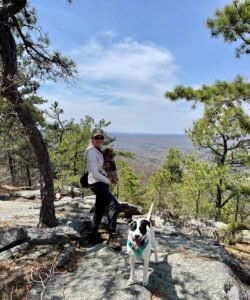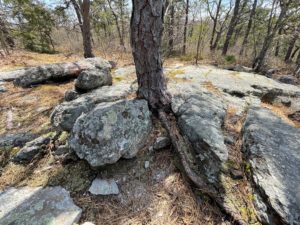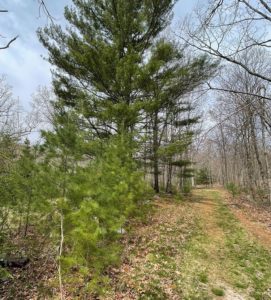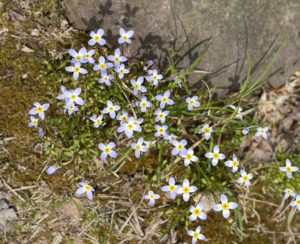Hello fellow readers, We recently hiked Blue Mountain Lake, an area frequently visited, though not in the summer. It’s become a beach for folks, not always respectful of others, playing loud music, leaving trash and dirty diapers attracting bears. Sad. But our visit was peaceful that day, enjoying the flora and reflections from Blue Mountain Lake.
How homeowners lost their homes
As we ascend the trail, we pass a patch of forsythia and daffodils leftover from the homes once there. Blue Mountain Lake is part of the Tocks Island Dam project, which evicted property owners in the 1950s to make way for a 37-mile dam between Pennsylvania and New Jersey. It was heatedly opposed by environmental protestors and residents and eventually abandoned; after residents lost their homes, many did not receive fair market value from the government exercising their eminent domain rights.
The 72,000 acres were assigned to the National Park Service and became part of the Delaware Water Gap National Recreation Area (DWGRA). And people like me cross country ski, snowshoe, or hike all around the abandoned roads which encircle three magnificent lakes – others hunt and fish.
Standing surefooted amongst the rocks.
We stop at Indian Rocks, named after the Leni Lenape that lived in the area—with glorious views of the Pocono mountains. Scrub Pines (Pinus virginiana) rooted themselves in the massive outcropping. Though not typically used in landscapes, its scraggly form is appealing, as is its stunning resilience standing surefooted as the native Americans did long ago.
Our next stop, Hemlock Pond, with a thick stand of healthy hemlocks (Tsuga canadensis) showing no evidence of woolly adelgid previously managed with biological controls.
We wiggle our way through a path less traveled or no longer maintained due to funding, filled with invasive Multiflora Rose (Rosa multiflora) brought here from Asia in the mid-1800s as rootstock for ornamental roses and then served as a living fence. Limited funds are the excuse for no longer plowing the access road for winter recreation.
On the way to Blue Mountain Lake’s main lake, I marvel over the baby White Pines(Pinus strobus) below the mama trees. And starry light purple flowers, low to the ground along the trail. My buddy Dennis Briede, fluent in native plants, identified the Bluets (Houstonia caerulea) that grow on compacted tufts.
“No National Park”
As we drove past Millbrook Village on our way home, a woman was posting a “No National Park” sign. I always thought it was a national park based on the name Delaware Water Gap National Recreation Area. Not so! The Delaware Water Gap Defense Fund’s initiative (nonationalpark.org) is to inform the public that the redesignation as a National Park is under consideration. Spearheaded by the Sierra Club of NJ and Pa, they say the redesignation may provide more funding and encourage more visitors to the area.
A recent article in the Philadelphia Inquirer states, “The Water Gap has an annual budget of $8.2 million from the National Park Service, while Yellowstone National Park’s budget is $27.6 million.” Though likely not all from federal funds.
If the designation changes, so may our privileges.
There are no fees to visit our Recreational Area; taxes pay for the privilege, but it costs to visit Yellowstone and Shenandoah National Parks – $30 or $35 per vehicle or$15 per person allows entrance for seven consecutive days. Or you can buy a year-long pass for all National Parks for $80.
According to OutdoorLife.com, approximately 4.3 million people visited the DWGRA in 2021—only 500,000 less than the approximate 4.8 million who visited Yellowstone last year.
There’s no hunting at Yellowstone, and they don’t allow dogs on the trails. Shenandoah touts one of the few national parks allowing dogs “on most trails,” though I couldn’t find information about hunting.
My mind jumps back to hiking Blue Mountain Lake years ago, coming upon an older man with his grandson staring at the land before him. His oversized faded shirt exaggerated his slim frame and slumping shoulders. I overheard him say, ‘I still can’t believe it’s gone,’ his voice cracking as he spoke. The energy of his grief melted into the pit of my stomach. There’s irony in the glorious beauty amid the heartache over the homes lost.
None of us own property; we merely borrow it. And hopefully, take respectful care of it while we do. But sometimes, sadly, it’s unfairly taken away. Garden Dilemmas? AskMaryStone@gmail.com (and your favorite Podcast App.)
There’s more to the story in Episode 58 of the Podcast:
Another story you’ll enjoy that took place at Blue Mountain Lake – Three Sister’s Gardening & Jolee’s Emergency
Link to Outdoor Life’s article and the Philadelphia Inquirer on the subject of the possible re-designation of the Delaware Water Gap National Recreation Area
The Delaware Water Gap Defense Fund (nonationalpark.org)







Good post!
So kind of you to say, Mary Thank you for sharing the garden of life with me :^)